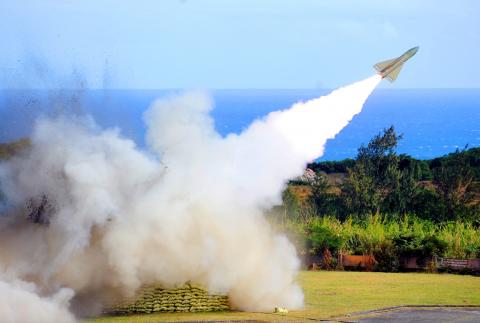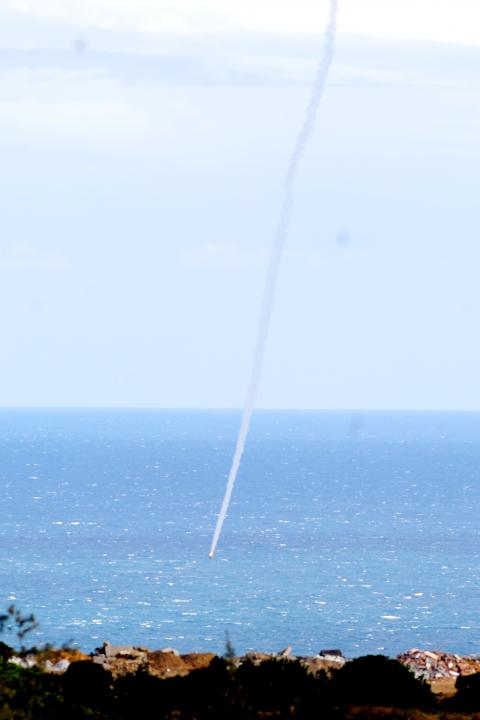President Ma Ying-jeou (馬英九) yesterday said he was “not happy” with the results of a major air defense missile test at a testing base in Pingtung County that coincided with the departure of Chinese President Hu Jintao (胡錦濤) for Washington on a state visit.
In the first major exercise open to the media at the Chungshan Institute of Science and Technology’s (CSIST) Jiupeng missile testing base in Pingtung County since 2002, three services — the air force, army and marine corps — fired 11 types of surface-to-air and air-to-air missiles, including the indigenous-made Tien Kung II “Sky Bow” (TK-II) and US-made AIM-7 “Sparrow.”
A total of 19 missiles were fired during the air defense drill.

Photo: Chang Chia-ming, Taipei Times
Months in the making and involving the participation of 576 members of the armed forces and the CSIST, the exercise showcased a number of platforms, including the F-16A/B, Mirage 2000, F-5E/F, Ching Kuo Indigenous Defense Fighter and AH-1W Cobra attack helicopter, as well as various ground-based launchers.
However, despite the impressive array, six of the 19 missiles encountered technical problems, with one Sparrow climbing about 200m into the air before radically changing direction and plummeting into the South China Sea.
Of the six malfunctions, four involved missiles coming close to their target, but failing to detonate, while the other two missed their target altogether.

Photo: Chang Chia-ming, Taipei Times
The TK-II, which has a range of 200km, performed handsomely, the military said, reportedly destroying its target at a distance of 100km. At its narrowest point, the Taiwan Strait is about 130km wide.
Air force Political Warfare Department director Pan Kung-hsiao (潘恭孝) told reporters at a debriefing that the military and CSIST were investigating the causes of the malfunctions. Early reports pointed to problems with tracking mechanisms and target acquisition.
At a press conference following the exercise, Ma, who had watched from a building overlooking the sprawling testing base located deep in the mountains, appeared unimpressed.
“I’m not satisfied with the results,” he said. “I hope the military will determine the reasons and improve its training.”
The Ministry of National Defense said an overall success rate of about 70 percent in such exercises was acceptable.
With 13 hits and six misses, yesterday’s rate was slightly short of its target, at 68.4 percent.
The exercise, which came on the heels of China’s unveiling of its J-20 stealth fighter, has given rise to speculation that its timing was no accident and constituted a response to Beijing.
Asked by reporters if the exercise was indeed meant as a countermove against Beijing’s military demonstrations or Hu’s trip to the US, Ma said the drill had “nothing whatsoever” to do with China and was intended to increase public awareness on defense issues.
Ministry officials told the Taipei Times that the timing of the exercise — the first of two to be held this year in the context of the celebrations surrounding the 100th anniversary of the Republic of China — had been set prior to the announcement of Hu’s visit to Washington or the Jan. 11 test flight of Beijing’s J-20.
The date of the second exercise has yet to be announced.

SECURITY: As China is ‘reshaping’ Hong Kong’s population, Taiwan must raise the eligibility threshold for applications from Hong Kongers, Chiu Chui-cheng said When Hong Kong and Macau citizens apply for residency in Taiwan, it would be under a new category that includes a “national security observation period,” Mainland Affairs Council (MAC) Minister Chiu Chui-cheng (邱垂正) said yesterday. President William Lai (賴清德) on March 13 announced 17 strategies to counter China’s aggression toward Taiwan, including incorporating national security considerations into the review process for residency applications from Hong Kong and Macau citizens. The situation in Hong Kong is constantly changing, Chiu said to media yesterday on the sidelines of the Taipei Technology Run hosted by the Taipei Neihu Technology Park Development Association. With

A US Marine Corps regiment equipped with Naval Strike Missiles (NSM) is set to participate in the upcoming Balikatan 25 exercise in the Luzon Strait, marking the system’s first-ever deployment in the Philippines. US and Philippine officials have separately confirmed that the Navy Marine Expeditionary Ship Interdiction System (NMESIS) — the mobile launch platform for the Naval Strike Missile — would take part in the joint exercise. The missiles are being deployed to “a strategic first island chain chokepoint” in the waters between Taiwan proper and the Philippines, US-based Naval News reported. “The Luzon Strait and Bashi Channel represent a critical access

CARROT AND STICK: While unrelenting in its military threats, China attracted nearly 40,000 Taiwanese to over 400 business events last year Nearly 40,000 Taiwanese last year joined industry events in China, such as conferences and trade fairs, supported by the Chinese government, a study showed yesterday, as Beijing ramps up a charm offensive toward Taipei alongside military pressure. China has long taken a carrot-and-stick approach to Taiwan, threatening it with the prospect of military action while reaching out to those it believes are amenable to Beijing’s point of view. Taiwanese security officials are wary of what they see as Beijing’s influence campaigns to sway public opinion after Taipei and Beijing gradually resumed travel links halted by the COVID-19 pandemic, but the scale of

Pope Francis is be laid to rest on Saturday after lying in state for three days in St Peter’s Basilica, where the faithful are expected to flock to pay their respects to history’s first Latin American pontiff. The cardinals met yesterday in the Vatican’s synod hall to chart the next steps before a conclave begins to choose Francis’ successor, as condolences poured in from around the world. According to current norms, the conclave must begin between May 5 and 10. The cardinals set the funeral for Saturday at 10am in St Peter’s Square, to be celebrated by the dean of the College